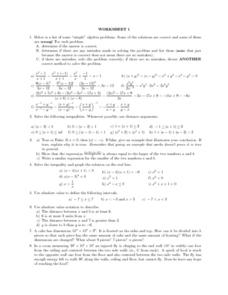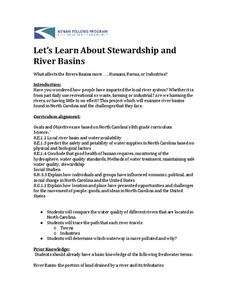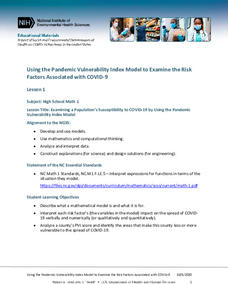Nuffield Foundation
Measuring the Rate of Metabolism
Plant respiration can be a difficult concept for young biologists to grasp; with a hands-on lab, learners can collect and graph data, then calculate the metabolism rate for the plants they studied. If you do not have a respirometer,...
Teach Engineering
Capillarity – Measuring Surface Tension
How do cohesion and adhesion work together? The third installment of a nine-part series teaches young scientists the difference between adhesion and cohesion. They also learn how cohesion and adhesion work together to cause capillary...
Nuffield Foundation
Measuring the Vitamin C Content of Foods and Fruit Juices
Are you getting enough vitamin C? Young scientists determine the amount of vitamin C in fruit juice samples. They accomplish this task by adding DCPIP solution to the samples until the blue color of the DCPIP persists. Once this happens,...
Curated OER
Measures To Combat Mad Cow Disease
Students read an article at CNNfyi.com about Mad Cow disease. They identify and explain bovine spongiform encephalopathy and Creutzfeldt-Jakob disease. They formulate ways to combat mad cow disease.
National Nanotechnology Infrastructure Network
Big vs. Little - Macro to Micro Lesson 3
A nanometer is the approximate distance your fingernail grows in one second. Hard to visualize, isn't it? The third of a five-part lesson on scale seeks to help learners understand the size of the nanoscale of measurement. Using examples...
Curated OER
Portrait Proportions and Flesh Tones
Using the provided blank face template, learners of any age draw to learn how to create proper facial proportions. This lesson focuses on two dimensional facial proportions, how to estimate those proportions, and drawing techniques. If...
Curated OER
Measurement: 2D and 3D
Young scholars solve volume problems. In this geometry lesson, the class watches a video about clean water (link provided) and individuals compare the volume of different prisms, including an actual drinking glass. Extension activities...
Illustrative Mathematics
Placing a Fire Hydrant
Triangle centers and the segments that create them easily become an exercise in memorization, without the help of engaging applications like this lesson. Here the class investigates the measure of center that is equidistant to the three...
Curated OER
Heterogeneous Equilibrium: Measurement of a Partition Coefficient
In this chemistry worksheet, students examine a concept in science and then use the knowledge in application by conducting an experiment.
Curated OER
Summer Bridge Activities
Youngsters start by writing a story about going to outer space. They then solve math word problems, match words to their correct meaning by using a dictionary, solve multiplication and division problems, and add the correct prefixes and...
Curated OER
Worksheet 1: Algebra and Inequalities
Challenge your young scholars' algebra skills with this activity, which presents students with several types of problem sets, including solving inequalities, graphing, word problems, and a set of algebra problems that may or may not...
Curated OER
Fun Food Faces
Students create tasty faces. In this food instructional activity, students use rice cakes to make a funny face. Students follow directions and use creativity for this activity. Students make a list of things they need from the grocery...
Curated OER
A Planting We Will Go
Even the youngest kids can make scientific comparisons using collected data. They read The Tiny Seed, then discuss the essential nutrients and elements needed for a seed to grow into a blooming plant. They plant seeds and track their...
Curated OER
Arc GIS Project: Visualizing the Holocaust
A cross-curricular lesson for middle schoolers that covers language arts, social studies, geography, and math, this is a great extension activity if your class is reading The Diary of Anne Frank or learning about the Holocaust....
Berkshire Museum
The Three Life-Giving Sisters: Plant Cultivation and Mohican Innovation
Children gain first-hand experience with Native American agriculture while investigating the life cycle of plants with this engaging experiment. Focusing on what the natives called the Three Sisters - corn, beans, and squash - young...
EngageNY
Proving the Area of a Disk
Using a similar process from the first lesson in the series of finding area approximations, a measurement resource develops the proof of the area of a circle. The problem set contains a derivation of the proof of the circumference...
NASA
Raisin Bread Universe
What is the universal breakfast? The resource includes two activities, the first one observing oatmeal to understand the texture of the universe. Then, scholars measure raisin bread dough before and after it rises to represent the...
NASA
Measuring Dark Energy
You're only 10 minutes late? Do you know how much the universe has expanded in those 10 minutes? Scholars graph supernovae based on their redshift and see if the results verify Hubble's Law. If it does confirm it, the universe is...
EngageNY
Addition and Subtraction Formulas 1
Show budding mathematicans how to find the sine of pi over 12. The third instructional activity in a series of 16 introduces the addition and subtraction formulas for trigonometric functions. Class members derive the formulas using...
EngageNY
Truncated Cones
Learners examine objects and find their volumes using geometric formulas in the 21st installment of this 25-part module. Objects take the shape of truncated cones and pyramids, and individuals apply concepts of similar triangles to find...
Beyond Benign
PPM
The 15th lesson in the series of 24 helps your classes understand the ppm (part per million) unit of measure. First, scholars experiment with food coloring to determine concentrations before applying their findings to calculate...
Baylor College
Lungometer
Life science learners construct lung-o-meters from gallon-sized milk jugs and then measure their lung capacities. For older students, have them graph the vital lung capacities of each person in the class. Cross-curricular pieces are...
Kenan Fellows
Let's Learn About Stewardship and River Basins
What does it mean to be a good steward? Middle school environmentalists learn to care for their state's waterways through research, a guest speaker, and poster activity. Groups must locate and learn more about a river basin and the human...
National Institute of Environmental Health Sciences
Lesson 1: Using the Pandemic Vulnerability Index Model to Examine the Risk Factors Associated with COVID-19
How vulnerable are you to COVID-19? High school mathematicians use the Pandemic Vulnerability Index to create models that help them collect and analyze data about the risk factors associated with COVID-19. After investigating four groups...
Other popular searches
- Measuring Volume
- Measuring Mass
- Measuring With a Ruler
- Measuring Length
- Measuring Distance in Space
- Measuring the Temperature
- Measuring Weather
- Inchworm Measuring
- Measuring Temperature
- Measuring Weight
- Measuring Inches Feet
- Measuring in Inches























